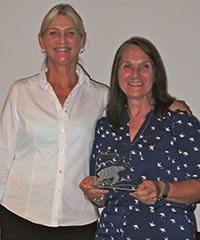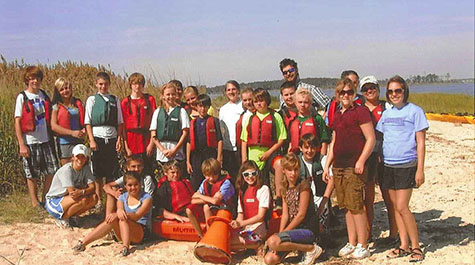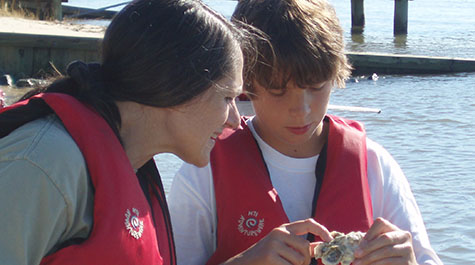Gloucester teacher honored with national educator award
The National Marine Educators Association (NMEA) recently recognized Sherry Rollins, a 7th-grade life science teacher at Peasley Middle School, with its 2014 Outstanding Teacher Award.
Rollins has long been associated with the Virginia Institute of Marine Science. A graduate of the College of William & Mary, she has partnered with VIMS-based educational programs and with the Chesapeake Bay National Research Reserve (CBNERR) at VIMS for more than 10 years.
Marine Education Specialist Carol Hopper Brill, VIMS extension staff affiliated with Virginia Sea Grant, says Rollins is a “dedicated advocate for VIMS and its contributions to educators and students.”
Presented each year at the NMEA national conference, the Outstanding Teacher Award recognizes an instructor who has exemplified effective and innovative classroom teaching. This year’s conference—held in Annapolis, Maryland—was Rollins’ first time attending the annual event.
“I was so surprised when it was my name that they called while presenting the award,” says Rollins. “I was in a room with 300 people who were just as qualified for it as me. I was blown away, and truly honored.”
In 2005, Rollins partnered with CBNERR for a field-based program that addressed 7th-grade life science Standards of Learning (SOLs) by introducing students to their local estuarine environments. The program—Chesapeake Studies for Virginia Middle Schools—was funded through NOAA’s Bay Watershed Education Training (BWET) program. It came to an end in 2012.
“Through the Chesapeake Studies project, Sherry was able to expand efforts to provide her middle school students with a meaningful outdoor experience that addressed the science curriculum and helped student gain a deep awareness of Chesapeake Bay and its inhabitants,” says Hopper Brill.
CBNERR Education Coordinator Sarah Nuss—organizer of the Chesapeake Studies program—has worked closely with Rollins during the past 9 years and says, “Sherry regularly participated in CBNERR educational programs previous to Chesapeake Studies and my arrival at VIMS. Her reputation as an engaging and dedicated science teacher preceded her.”
Rollins says the thing that makes her so passionate about Bay education is the simple fact that kids are our future. “If the Bay is in its glory, it will be here for future generations,” she says. “I want to raise environmental stewards not only for Chesapeake Bay, but for our oceans and our planet.”
“Sherry goes out of her way to ensure her students receive the best science education possible,” says Nuss, “whether that means lugging oysters from her oyster float in Poquoson to Gloucester, extending the impact of our CBNERR field trips into the classroom through student projects, taking her students on overnight trips to see Chesapeake Bay first-hand, or encouraging students to attend CBNERR programs at VIMS, like our Discovery Labs and summer camps.”
In addition to her work with the Chesapeake Studies project, Rollins participated in the VIMS PERFECT/GK-12 Partnership. The NSF-funded project supported graduate students in science, technology, engineering, and mathematics (STEM) through interactions with teachers and students in K-12 schools from 2009-2014.
Hopper Brill says Rollins jumped whole-heartedly into the demanding program, working with VIMS graduate students during the summer, then hosting between one and three fellows as classroom “scientists in residence” each year.
Rollins says with graduate students in the classroom, her students gained invaluable exposure to everything from the vocabulary of marine science, to the application of the scientific method, and real-world examples of scientific research and experimental design.
“It’s always a pleasure stepping into Sherry’s classroom,” says Nuss. “You immediately get a sense of a “real science classroom” filled with aquariums, plants, posters, and experiments.“
A self-proclaimed lifelong learner, Rollins took graduate courses at VIMS, Christopher Newport University, and Virginia Commonwealth University before embarking on her 26-year career as a teacher. In 2006, she earned her Master’s degree in Integrating Technology in the Curriculum from Walden University.
In addition to her long history with VIMS, Rollins has several other productive collaborations including a 12-year partnership with Oyster Reef Keepers of Virginia and a 6-year collaboration with the Chesapeake Bay Foundation’s Teachers on the Bay program.
Rollins is an active member of the Mid-Atlantic Marine Education Association (MAMEA)—a regional chapter of NMEA—and has shared her teaching experiences with fellow educators at annual conferences. She and teaching partner Judy Gwartney-Green have delivered presentations on Incorporating the Local Environment into Your Classroom and on the Implementation of Experiential Field Studies trips.
“Sherry is gracious and generous in helping any teacher who seeks advice about incorporating more field experiences in their science classes,” says Hopper Brill.
With all that Rollins has done for her school, county, and region, it’s no surprise that she has received other kudos in the past. In 2010, she made a clean sweep of local honors when she was recognized as Page Middle School’s Teacher of the Year, Gloucester County Middle School Teacher of the Year, and Gloucester County Teacher of the Year. In 2012, MAMEA recognized Rollins with its regional Classroom Teacher Award.
Despite some hefty challenges that have come her way—including the tornado that destroyed Page Middle School in 2011—Rollins has continued to enrich her science classes with unique experiences. Each year, her students learn about growing oysters, and get to explore the Bay on field trips.
“Sherry has devoted her personal time after school and on weekends to take students on boat and canoe trips,” says Hopper Brill. “She invests in the team approach with other teachers at her school by developing a network of partner institutions whose programs and projects can benefit her teaching team and all of their students.”
In her own words, Sherry believes in providing her students with “not just a shot of science, but a steady diet of it.”
“Sherry’s dedication to her students, determination to offer authentic science experiences, and her spirit of collaboration and teamwork make her most deserving of the 2014 Outstanding Teacher Award,” says Hopper Brill.



